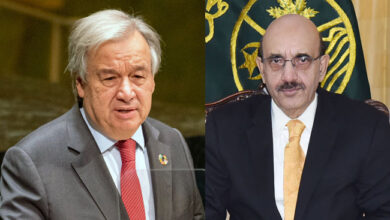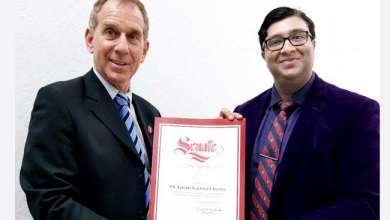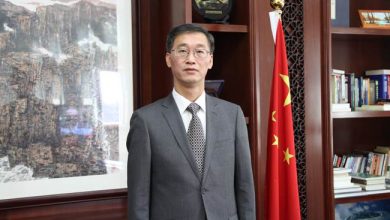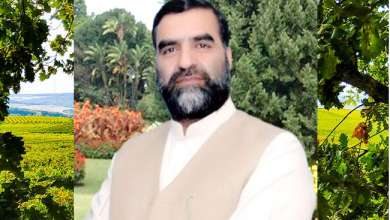The US has unfettered access to information and data on the outbreak from China
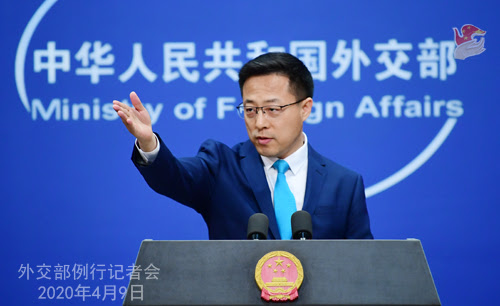
Foreign Ministry Spokesperson Zhao Lijian’s Regular Press Conference on April 9, 2020
China Daily: According to media reports, a Finnish government official said on April 8 that a batch of surgical masks and respirator masks unloaded on April 7 from Guangzhou, China, have turned out to be unsuitable for use in medical environments. Other European countries had reportedly met similar problems after ordering equipment from China. What is your response?
Zhao Lijian: We noted relevant reports. After looking into the matter, the Chinese authorities found that the masks were purchased through commercial
Countries around the world are fighting the pandemic. China is eager to meet the urgent needs of other countries while overcoming its own difficulties. Our enterprises have been working overtime to provide various anti-epidemic materials to the international community. We always attach great importance to the quality of export products. Recently, the Chinese authorities introduced tricter regulatory measures, requiring relevant exporting enterprises to provide written or electronic statements when declaring to the customs that their exports have obtained the registration certificate for medical device from the State Food and Drug Administration and met the quality standards of the importing country or region.
China Review News: Could you tell us to which countries has China sent medical teams so far? What is consideration behind the selection of these countries? Some said China is trying to export the “Chinese model” for governance through such means. Do you have any comment?
Zhao Lijian: So far, China has sent 12 teams of medical experts to 10 countries, namely Italy, Serbia, Cambodia, Pakistan, Iran, Iraq, Laos, Venezuela, the Philippines and Myanmar, to help them combat COVID-19. The Chinese experts shared their experience with local medical workers, helped them improve their ability in epidemic prevention, containment, diagnosis and treatment, and boosted their confidence in jointly overcoming the pandemic. Their efforts have been well recognized by the governments and people of these countries.
China is making such efforts to reciprocate the goodwill we received earlier during the pandemic, to act on international humanitarianism and to implement the vision of a community with a shared future for mankind. We will never stand aloof and shun our friends when they are in trouble, and we will never pick and choose nor attach any strings when extending a helping hand. By working with the rest of the international community in this global war against the epidemic, China’s goal is nothing but making concerted efforts and giving mutual assistance to tide over difficulties together. Our commitment to this goal is firm as always.
No country is immune to this abrupt global public health crisis, and the international community needs solidarity and cooperation more than ever. China is determined to ensure effective prevention and control of the epidemic at home, strengthen international anti-pandemic cooperation and take an active part in global health governance. This is our responsibility and commitment that serves the common interests of all mankind. We have never exported the Chinese model to anyone, nor asked anyone to copy China’s methods. China stands ready to continue to uphold the vision of a community with a shared future for mankind, pool the strength and wisdom of all parties, share and exchange useful practices with all parties, carry out joint prevention and control, and support the role of WHO and other international organizations, so as to stem the spread of the pandemic around the globe and win the final victory of international battle against COVID-19.
BBC: It seems all the border connections between China and Russia have been closed now. Could you confirm that? If so, is it targeting only the people or is it including the goods, too? And how worried is the Chinese government about the influx of cases of Chinese citizens returning from Russia?
Zhao Lijian: As learned by the Chinese embassy in Russia, in order to contain the spread of the pandemic, Russia has asked all residents in the country to stay at home for self-isolation from March 28 to April 30. Our embassy also learned from the competent authorities of the two sides that all land border points of entry for people traveling between China and Russia have been temporarily closed. The embassy reminded Chinese citizens in Russia to pay attention to the above information, comply with Russia’s pandemic prevention regulations, exercise self-isolation accordingly, strengthen self-protection, avoid long-distance travel, and make science-based decisions in their pandemic-related responses.
The Chinese foreign ministry and our diplomatic missions in Russia attach great importance to the safety and health of all Chinese citizens there. Since the outbreak of the epidemic, they have been in close contact with Chinese citizens in Russia to get to know their situation and needs and help them overcome difficulties. Meanwhile, China is also in close communication and coordination with Russia to safeguard the safety and health of Chinese citizens. We will continue making every effort to provide Chinese citizens with assistance.
Follow-up: Just to confirm, goods can still be delivered across the border, right?
Zhao Lijian: All land border checkpoints for travelers between the two countries have been temporarily closed. I have nothing to update you at the moment.
Follow-up: Did the Russian government make the decision to close the border and inform the Chinese government?
Zhao Lijian: As I said, the Chinese embassy in Russia learned this from the competent authorities of the two sides.
RIA Novosti: As there are still many Chinese citizens in Russia who want to come back home because of the epidemic situation, is the Chinese government considering sending some chartered flights to Russia to assist these people?
Zhao Lijian: China attaches high importance to the safety and health of Chinese nationals in Russia. We will stay in close contact with the Russian side and urge it to provide convenience and guarantee for our citizens with regard to their stay and medical needs. Our embassy is in close contact with our citizens there to provide consular protection and assistance, and help them properly deal with the epidemic. There are still commercial flights between our two countries.
China and Russia are in communication through diplomatic channels. I have no further information to offer at the moment.
CCTV: As people are fighting the COVID-19 pandemic, some media say there has recently been discrimination against Africans in Guangdong. Can you comment on that?
Zhao Lijian: Since the COVID-19 outbreak, China and African countries have been supporting each other in fighting the pandemic. We won’t forget the support voiced and provided by African countries and their people when we were at the most crucial stage of the fight. Now we are closely following the situation in Africa. The Chinese government and people are doing our best to help them. Faced with the severe test of epidemics, China and African countries are united more than ever, demonstrating brotherhood in times of adversity.
As for what you mentioned, we noted reports on that. I’d like to stress that we treat all foreign nationals equally in China. We reject differential treatment, and we have zero tolerance for discrimination.
Countries all over the world are taking measures to contain the pandemic. In China, our most urgent task is to prevent imported cases and domestic resurgence. To meet this goal, we need understanding, support and cooperation from both Chinese and foreign nationals in China. In the meantime, we pay high attention to the occasional incidents and misunderstandings in this process. We urge relevant authorities to improve working methods, and hope all foreigners in China will strictly observe local anti-epidemic regulations, and cooperate with and support us in fighting the virus. Together we will achieve the final victory.
The Paper: US Secretary of State Pompeo said in an interview that “we’ve been under this enormous challenge here with this virus, and it began in Wuhan, China.“ The US tried to get into China, and they weren’t successful at the front end. “When you hide, when you obfuscate, when you penalize people who come forward and who want to talk about what really happened, that’s just unacceptable.“ He also said that “in a time of crisis, you find out that the value of transparency and the ideas we have in America of liberty.“ I would like to know your response to his words.
Zhao Lijian: In response to Mr. Pompeo’s remarks, I would like to make the following comments:
First, China was the first country to report the novel coronavirus outbreak to the WHO, but that does not mean that the virus originated in Wuhan. An epidemic can originate in any city, country or region in the world. The origin of the novel coronavirus is a serious scientific issue that should be addressed by scientists and medical experts. On April 8, Wuhan breathed a new life after a 76-day lockdown was lifted, boosting confidence in the global fight against the virus. There is a growing recognition that China’s approach has worked and that China’s experience is worth learning from. Any responsible country will stand firmly against the unjustifiable practice of labeling viruses.
Second, so-called “China’s cover-up and intransparency” is groundless. We repeatedly talked about the timeline of detailed communication between China and the US. After the outbreak of the virus, China immediately reported it to the WHO, shared the genetic sequence with other countries, and carried out international cooperation among experts in epidemic prevention and control, which received positive feedback from the international community.
The US has unfettered access to information and data on the outbreak from China. At the end of January this year, the Chinese Center for Disease Control and Prevention and other research teams published articles in medical journals of international prestige like the New England Journal of Medicine and the Lancet, introducing to the world the research results of Chinese scientists on the epidemiological features of COVID-19. In February, scientists from the US Center for Disease Control and Prevention and the National Institutes of Health participated in a joint mission of experts from China and the WHO, and got a comprehensive understanding of the epidemic situation and prevention and control efforts in China through field visits. Dr. Anthony Fauci, director of the US National Institute of Allergy and Infectious Diseases, believed that it was with China’s genetic code in hand that the US scientists can start vaccine development work rapidly. China has done what it can and should do. As for whether the US has made full and effective use of the precious time and important information China has gained, and whether it has taken timely measures to prevent and control the virus, I believe time will tell.
Third, the stigmatization of China is unpopular. Viruses know no borders, no races, and no social systems. All countries should always put their people’s right to life and health first and provide adequate and effective protection. Under the leadership of the Communist Party of China, China’s fight against the epidemic has achieved remarkable results. Slanders and accusations on others won’t make oneself immune from the virus. We hope that the American people can also overcome the epidemic at an early date and resist the narrow-minded approach of certain politicians who politicize the epidemic and stigmatize China to shift the blame.
Beijing Youth Daily: The Hague-headquartered Organization for the Prohibition of Chemical Weapons (OPCW) released today the findings of the first report by its Investigation and Identification Team (IIT). The report concludes that the Syrian air force used chemical weapons in three separate attacks on Ltamenah in March 2017. What is your comment?
Zhao Lijian: The Chinese side has taken note of the report. I would like to take this opportunity to reiterate that China always firmly opposes the use of chemical weapons for any purpose by any country, organization or individual
However, at the same time, we also believe that the establishment of the IIT is not in accordance with the provisions of the CWC, that its work does not reflect the principle of making comprehensive, objective and fair investigation, and that its conclusions cannot withstand the test of time and truth. Many countries, including China, have opposed the establishment of the IIT from the very beginning, and our position has not changed. China is deeply concerned that some countries have pushed for the establishment of this mechanism for geopolitical purposes, which has further politicized the issue of chemical weapons in Syria and driven further apart the parties to the CWC.
We call on relevant countries to strictly abide by the provisions of the CWC, bridge differences through dialogue, properly handle the issue of chemical weapons in Syria, safeguard the authority of the CWC, and refrain from doing anything that may further undermine peace and stability in the Middle East.
TASS: When will the China-Central Eastern European Countries Summit take place? Are there any changes in the agenda?
Zhao Lijian: As the COVID-19 pandemic spreads in Europe and other parts of the world, it is urgent for every country to focus on containing it. China will continue working with CEE countries and supporting each other in this regard.
China will stay in contact with other countries on the date of the China-CEEC summit in 2020.
BBC: Many scientists praised the speed with which China got the genetic sequence out and no doubt there has been a lot of effort from the national government of China to pass information on to other countries. But also, don‘t you think at the earliest stages in Wuhan there are questions and the wash-up of all this need to be reflected upon in China? Even the mayor of Wuhan apologized to the people there that he was too slow in getting out the warnings because he didn‘t have clearance from above to do so. Some would say there was a sort of cover-up there in Wuhan. What would you say to that?
Zhao Lijian: China has been open, transparent and responsible in updating WHO, other countries and regions of the epidemic data, which has been highly and unanimously acclaimed by the international community.
It is unfair and unjust to say there was a “cover-up” in China. After the COVID-19 broke out, the Chinese people have been making concerted efforts in fighting it, which has bought precious time for and made important contributions to global response. As the coronavirus is novel, it took us some time before we knew more about it. There is no so-called “cover-up” at all.
Xinhua News Agency: Ten years after the signing of the New START treaty, Deputy Chairman of the Security Council of the Russian Federation Dmitry Medvedev wrote an op-ed on April 8, saying if the New START deal ceases to exist, its demise will have extremely serious consequences for international security. The Russian foreign ministry also said in a statement that it hoped the US can respond to the extension of the treaty as soon as possible. I wonder if you could comment on that?
Zhao Lijian: The New Strategic Arms Reduction Treaty (New START treaty) is an important and the only existing bilateral nuclear disarmament arrangement between the US and Russia. Its extension draws widespread attention from the international community. This issue not only bears on the Russia-US strategic security relations, but also concerns global strategic stability. China supports Russia and the US in maintaining dialogue on the New START and extending the treaty at an early date for the sake of international peace and security. In the meantime, as a principle, the US and Russia, in possession of over 90% of the world’s total nuclear weapons, have the obligation to fulfill special and primary responsibilities in nuclear disarmament following the consensus of the international community, including UNGA resolutions and other UN instruments. While upholding the New START, they should further drastically reduce their nuclear arsenal.
Reuters: The head of the WHO has accused Taiwan of making racist attacks against him. Do you agree with this accusation?
Zhao Lijian: China opposes any attempt to use the epidemic for purpose of politicization or stigmatization, and strongly condemns the personal attacks and racist words and deeds against WHO DG Tedros.
Under the leadership of DG Tedros, the WHO has played an important role in assisting countries’ responses to the epidemic and promoting international anti-epidemic cooperation by actively fulfilling its responsibilities and upholding an objective, science-based and unbiased stance, which has been widely recognized and highly praised by the international community. China supports the WHO in continuing to play a leading role in global anti-epidemic cooperation.
Since the outbreak of COVID-19, the DPP authorities in Taiwan have been doing all they can to make reckless political maneuvers and hype up Taiwan’s participation in the WHO and the World Health Assembly. Their real intention is to seek independence under the pretext of the pandemic. We are firmly opposed to that. Their scheme will never succeed.
China National Radio: You announced yesterday that a Chinese medical team will travel to Myanmar to help fight the pandemic. Could you brief us on what the team is going to do there?
Zhao Lijian: The 12-member medical team dispatched by China arrived in Yangon, Myanmar yesterday. The Chinese ambassador to Myanmar and the Minister of Health and Sports of Myanmar welcomed the team at the airport. Myanmar said that China’s assistance comes at a time when it is in urgent need, which is a symbol of the paukphaw friendship between the two countries, and China’s experience on COVID-19 is worth learning. They believe that China’s help will enhance Myanmar’s capability in epidemic prevention and control, diagnosis and treatment, and contribute to the efforts to put the epidemic under control and defeat it at an early date.
As we understand, the Chinese experts will share China’s experience with Myanmar, and the two sides will exchange views on medical treatment, epidemic prevention and control and laboratory testing, and provide guidance and training to relevant personnel. A batch of protective and medical equipment and other supplies donated by the Chinese side also arrived with them.
The cooperation between China and Myanmar reflects China-Myanmar paukphaw friendship and the spirit of the community with a shared future featuring mutual assistance. The Chinese government and people will never forget the support and help we received from Myanmar earlier amid the epidemic. China stands ready to continue to provide its utmost assistance to meet the practical needs of Myanmar in fighting the epidemic. We are ready to work with Myanmar to jointly defeat the epidemic and push forward China-Myanmar relations.
Shenzhen TV: We note that WHO responded to US accusations of it being partial. Yesterday, a spokesperson for the UN Secretary-General said Guterres believed WHO is critical to the world’s efforts to win the war against COVID-19. What is China’s comment?
Zhao Lijian: Since the outbreak, WHO led by Director-General Tedros has been actively performing its duties and upholding an objective, science-based and impartial position. It has played an important role in helping countries to respond to the pandemic and promoting international cooperation, which has been well recognized and acclaimed by the international community. Recently, the UN Secretary-General and political figures and heads of many countries and international organizations, such as the African Union, France, Rwanda and Ethiopia, publicly expressed their support for WHO and stressed the need for the international community to strengthen anti-pandemic cooperation.
The recent G20 extraordinary summit issued a statement affirming full support and commitment to further enhance WHO’s role in coordinating international action against the pandemic. China will, as always, firmly support the work of WHO and its leadership in global cooperation on COVID-19.
At present, the pandemic is spreading all over the world. What the international community needs most is confidence and concerted response. We hope that all countries will work together to win the battle against this major infectious disease.


